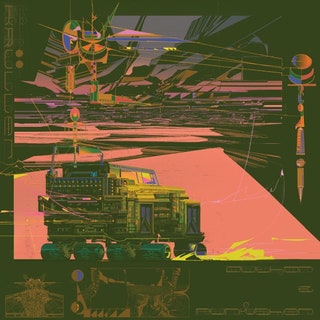The San Diego artist incorporates a grungy alt-rock influence into his grinding industrial music, revealing a tuneful, human side to his work.
Though his riffy, theatrical drone music is admired by many noise and experimental music fans, Tristan Shone, aka Author & Punisher, is by all rights a metal act. His songs grind with industry and groan with doom; he chestily shrieks while torturing raw signals until they sound like an electric guitar’s night terrors. The addition of actual guitars to Stone’s abstract electronics on his latest album, Krüller, should only strengthen the metal vibe. But friends, as Shone’s fellow teen of the 1990s, I know an alt-rock record when I hear one, and this toweringly tuneful, neurologically thrilling, and, once in a while, just slightly corny music sounds as much like Alice in Chains as it does Godflesh, Throbbing Gristle, or even Nine Inch Nails.
Shone hardly ever discusses his influences, though. The interview time usually runs out while he’s still trying to describe how his music works. At root, he uses the same instruments as other electronic musicians: MIDI signals, frequency oscillators, Ableton Live. But, drawing on a professional and academic background in mechanical engineering and sculpture, he designs and builds his own unique controllers, which he calls drone and dub machines and which look a bit like heavy-duty metal torture devices. (His first commercial line of bespoke audio gear appears with Krüller.)
Many of Shone’s machines are wearable, encumbering his limbs or hindering his efforts in some way, such as a pair of motorized throttles that, when pushed, can push back against him. With masks and trachea microphones capturing his desperate vocalizations, he portrays the plight of the individual against overwhelming forces. It makes for unforgettable stagecraft, like a noise drama in which a man struggling to become a cyborg plays a cyborg struggling to remain a man. But it’s also inextricable from the recorded music and how it gets such rough hands on abstractions like resistance, struggle, exhaustion, and transcendence.
Tuneful vocals and traditional structures have always lurked in Shone’s music, moments of order ruffling the chaos of heavy textures and combustive dynamics. They started to grow pronounced on 2018’s Beastland, and they come to a head on Krüller. The first and best song, “Drone Carrying Dread,” has a rather deceptive title, being an eight-minute anthem of slow, tattered joy. Shone winds a silver staircase of guitar sustain around endlessly rising columns of gleaming shoegaze. It sounds at first like My Bloody Valentine but soon intensifies with violently pounding snares and multi-tracked vocals that switch from a sneer to a growl in the span of a leapt octave. A fine old grunge device, it occurs frequently on a record that seems to take the exact moment when Layne Staley bites into the chorus of “Would?” as its guiding light.
It’s true that doom and grunge have the same roots in Black Sabbath, and the ’90s rock connection might seem overstated when you’re listening to something like “Incinerator,” an industrial sludge furnace with metal screams and countless detours, but even that song admits a perfectly Stone Temple Pilots bit of wasted pastoralia. (It starts just before 5:00, if you’re curious.) And did I mention that the rhythm section of Tool shows up on the marauding “Centurion,” which perhaps sounds a little too late-’90s, a hair too close to a nu-metal Chad Kroeger, for total comfort? That’s the dangerous allure of this big-lunged, palate-pinching style of singing; there’s a fine line between Eddie Vedder and the legions of anodyne imitators.
One the best songs, “Maiden Star,” shares a more vulnerable, natural vocal timbre with “Drone Carrying Dread.” The overriding aggression of the rhythm relaxes into more graceful drapes and swags, with shades of Sunny Day Real Estate, yet the tempo is whipped around by unseen rotors. It’s an example of the uncanny effects Shone’s interface wreaks upon his music, which is also perceptible in the embalmed soul of “Glorybox” and the infernal EDM of “Blacksmith.” If Krüller is warmed by a nostalgic human past, it also bears the chill of a posthuman future where the machines grind on without us, an intimation that seeps from his music like a corrosive fluid and lends these songs a bitter, heroic weight.



0 comments:
Post a Comment